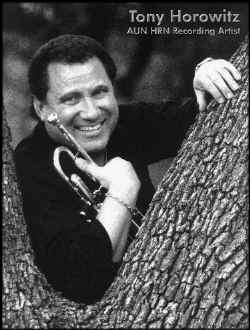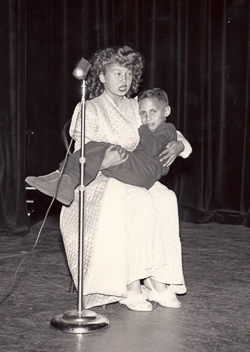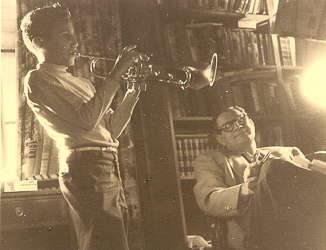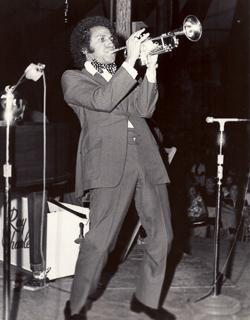 It was on the 16th of September 1945, that I made my way out of my mother’s womb to join life on this planet. I was the by-product of the lust of a happily married couple living in Valley Stream, Long Island, which is located just outside of Manhattan. Their names were Charles and Sally Horowitz. My brother, Bob, had gone through the same ritual five and a half years earlier. It was a good time to be born. The German paper-hanging maniac with the tooth-brush under his nose had chosen a self-inflicted bullet to his brain in a Berlin bunker after killing his brand new bride, rather than surrender to the Allied powers, thus avoiding prosecution for everything from crimes against humanity to blatantly poor sartorial taste. His ally, the bullet-headed dictator of Italy had been strung up a while earlier by his fellow countrymen, along with his inamorata, for similar crimes, along with too much mugging in front of cameras. And they say that dictators aren’t romantic. The emperor of Japan got off a lot easier, so that he could live his life out riding his big white horse around the country that he at onetime ruled. Just about the only nice thing that comes to mind about these three ne’er-do-wells were the cars they had at their disposal. Other than that, the world that I came into was a lot better off without them, or their widespread idiocy.
It was on the 16th of September 1945, that I made my way out of my mother’s womb to join life on this planet. I was the by-product of the lust of a happily married couple living in Valley Stream, Long Island, which is located just outside of Manhattan. Their names were Charles and Sally Horowitz. My brother, Bob, had gone through the same ritual five and a half years earlier. It was a good time to be born. The German paper-hanging maniac with the tooth-brush under his nose had chosen a self-inflicted bullet to his brain in a Berlin bunker after killing his brand new bride, rather than surrender to the Allied powers, thus avoiding prosecution for everything from crimes against humanity to blatantly poor sartorial taste. His ally, the bullet-headed dictator of Italy had been strung up a while earlier by his fellow countrymen, along with his inamorata, for similar crimes, along with too much mugging in front of cameras. And they say that dictators aren’t romantic. The emperor of Japan got off a lot easier, so that he could live his life out riding his big white horse around the country that he at onetime ruled. Just about the only nice thing that comes to mind about these three ne’er-do-wells were the cars they had at their disposal. Other than that, the world that I came into was a lot better off without them, or their widespread idiocy.
In March of 1946, my family moved from Valley Stream to North Hollywood, California. North Hollywood, as well as the rest of the San Fernando Valley, was still semi-rural at that time. Music was a constant in the Horowitz household. My parents, if not listening to the radio, would be playing 78 rpm records. They were devotees of the jazz of that era, along with opera. When my father would make his special spaghetti sauce, he would have Ferruccio Tagliavini recordings blasting throughout the house. It was an intoxicating combination that has stayed with me to this day. The smells and sounds were just that wonderful.

“Little King of Toyland” Age 4.5
Early in 1953, while my mother was doing her household chores, I heard a sound on the radio that stopped me dead in my tracks. I ran into the kitchen to ask her what it was that I was hearing. She smiled broadly and said, “That’s a trumpet darling.” I didn’t know at that moment that it was Ziggy Elman playing his classic chorus on a song that he had composed, along with Johnny Mercer, “And The Angels Sing.” I told my mother, with total conviction, that that was what I wanted to do for my whole life. Again she smiled and told me that I’d have to wait until my permanent front teeth grew in before I could undertake learning to play that instrument that took me from the commonplace of our living room into a rarified someplace that existed somewhere in the depths of my mind. From that day on, whenever I heard a trumpet solo on the radio, everything else in my little cosmos ceased to exist. I didn’t know at the time that I was listening to Harry James, Ziggy Elman, Roy Eldridge, Ralph Marterie, Rafael Mendez, or any of a hundred other wonderful artists. All I knew was that it was a trumpet, and I was going to play one one of these days. That day came on the 9th of March 1955.
By mid-February 1955, my front teeth were just about in and set. I naturally kept making mention of this to my mother. Finally on the 9th of March, she gave a note to me to give to our grammar school music teacher, Mrs. Mason, asking if we could rent a trumpet from the school. Mrs. Mason looked at the note, looked at me, and then at the note again. She mentioned that usually a child should weigh one hundred pounds before tackling a trumpet because of the backpressure of air involved. I had no idea of anything she was alluding to. All I knew was that I wanted a trumpet. Finally, after a bit of pleading, as only a scrawny nine-year-old can, she relented, and let me take home a cornet. It was the most beautiful, most wonderful, most magical thing I had ever seen, or touched. When I got it home, I showed it to my big brother, Bob, figuring that he knew everything about everything, and thus could show me how to “work it.” When he said that he had no idea what to do with it, I went into an instant funk. Then, out of the “clear blue,” he said that his friend, Bradley, played oboe, and would probably know how to “work the cornet.” Bob called Brad and told him what I needed. Brad jumped on his bike, and came to our house. He showed me how to hold the horn, as well as set my lips. He then showed me how to “finger” the notes with the seven valve combinations. That was it. I was in heaven. The first thing I did was figure out the notes to the opening theme of the radio show “Dragnet.” I had no notion that this sense of pitch was a gift. I just thought that it was “really cool daddy-o” that I could play whatever I heard in my little head.
After hearing me play a couple of other songs, my mother contacted a local gentleman, Alfred Anderson, who went from house to house giving lessons on just about every instrument in an orchestra. As a matter of fact, he had an entire orchestra comprised of just his private students. He too played a cornet, not a trumpet. He assigned various exercises for me to learn, along with some songs. By the time I had been studying with him for five months, he told my mother that he had taken me as far as he could, and that she should seek a professional teacher for me. It was during those first five months that, among other things, I had “picked out” the Ziggy Elman solo on “And The Angels Sing” note for note, and nuance for nuance. I still didn’t know the name, Ziggy Elman, much less attach it to the sound that I had heard on the radio.

Lesson with Ziggy Elman (March, 1958)
One Friday morning, as I was getting ready for school, my mother told me to be sure and come straight home after school. This meant “no fooling around, or playing games after school.” School let out at 3:00. As I was going across the playground, I saw that a game of tetherball was in progress. I wasn’t very good at kickball, or sockball, but I was very good at tetherball. This was too good for my ego to pass up. As I was playing, I was suddenly aware of my mother’s presence. She reminded me in no uncertain terms that I was to get home immediately, and get cleaned up. We had to go someplace. As we got into the car, she made sure that I had taken the trumpet that she had rented for me, after returning the cornet to Mrs. Mason. While driving, she told me that I was going to have an audition with a “real” trumpet teacher. When we arrived at the house of the “real” trumpet teacher, a tall, friendly gentleman greeted us at the door with a big smile on his face. He introduced himself to us. His name was Ziggy Elman. The name didn’t “ring a bell” with me.
For my audition, he asked me to play some scales. Upon completing the mandatory scales, he asked if I knew any songs. I didn’t think that “Dragnet” would be appropriate, and I found “Granada” boring compared to my all-time favorite, “And The Angels Sing,” which I proceeded to play. As I was playing it, Zig’s wife, Ruby, yelled from the kitchen for Zig to stop playing because of his impending surgery. At this point, Zig walked into the kitchen to show Ruby that it was not he who was playing his solo, but rather, “the kid in the living room.” When I finished playing, Ruby and Zig both hugged me. It was then that I learned that it was Zig to whom I had been listening all of those years. What a fantasy come true. Here I was face to face with the person who inspired me to take up the trumpet, and HE LIKED ME! He even gave an autographed copy of his recording of “And The Angels Sing” to me. To say that I was in heaven would be as gross an understatement as saying that the Grand Canyon is a pretty big ditch.
This was the launching pad of what was to be a career that took me around the world, introduced me to, as well as allowed me to perform with some of the biggest stars in the field of entertainment, from Sammy Davis, Jr., Ray Charles, and Barry White, to Raquel Welch, Pearl Baily, Louis Bellson, and Dizzy Gillespie. My trumpet made it possible for me to fulfill my dreams of playing on radio, television, movies, recordings, and at some of the greatest concert venues in the world, including Carnegie Hall, The Hollywood Bowl, and Lincoln Center, along with the lounges of Reno, Lake Tahoe, and Las Vegas with such luminaries as country music star, Jimmy Wakely, and the king of the lounges, Louis Prima, who dubbed me his “protege.”
Tony Solos with Ray Charles

Tony Solos with Ray Charles
Having been fortunate enough to have been a studio session player in the hallowed studio halls of Hollywood, I’ve had the thrill of hearing my playing in such diverse settings as “Knight Rider,” “Cheers,” “Happy Days,” and numerous other TV shows, Jermaine Jackson’s hit recording, “Let’s Get Serious,” as well as hits by other artists ranging from Johnny Mathis and Jane Oliver, to Janis Ian, the Kevin Bacon movie, “Quicksilver,” the classic film, “La Bamba,” as well as many other soundtracks, and hit recordings. Don’t let anyone fool you. It’s always a bit of a “kick” to hear yourself on the radio, television, or on a movie soundtrack, especially if you’re a soloist, which I was fortunate enough to be called upon to be in many instances. The “Hi Mom” stuff is always a thrill.
Teaching, whether privately, or in a clinic situation, is another rewarding field. Having been privileged by preparation and circumstance to have accomplished a number of diverse things in the field of music as a player, writer, conductor, and entertainer, it’s nice to know that I can pass on that which I’ve gleaned through the years to a new crop of “eager young lions.” I’ve had the wonderful thrill of seeing some of my former students become “first call” players in their chosen areas of music. Some have stayed in touch with me, and remind me of what it was like to have studied with me. When I was teaching at the Dick Grove School of Music, a number of my more advanced pupils referred to my course as “The Tony Horowitz Musical Assault and Confidence Course.” They knew that if they could master what I was teaching, to my satisfaction, that they could handle themselves in just about any professional situation they were likely to encounter. I guess one could akin it to “Tough Love.” My philosophy as a performing artist is similar to what I was taught in the U.S. Army, when I was drafted for Vietnam, “More sweat in training means less blood in battle.” This is why I mentioned preparation and circumstance previously. The basic idea behind my teaching is that you cease to “play your instrument, and start to play music.”
One cannot spend seventeen years on the road with major stars, and not have some pretty goofy stories, that never appeared in publications, or on the news. It’s great having these little “secret tidbits” that you share only with your colleagues who have also “been there, done that, and got the tee shirt.” Other stories, which are more “G Rated,” are fun to share with everyone. Yes, that includes you. I plan on opening up some of the “outtakes” of the road, as well as the studios, as I go along. I hope that you enjoy, and can get a feel for what it is like to live one’s dreams. If this “saga” inspires you to follow your dreams also, then this, to me, is a blessing.
